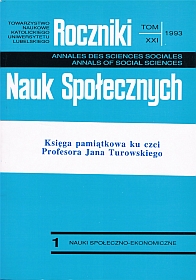Moralność religijna młodych Polaków w nowoczesnym społeczeństwie
Abstrakt
In the present paper, on the basis of sociological research conducted in the years 1989-1991, the author watches the transformations of the religious morality in young Poles under the conditions of passing from a society managed in a totalitarian way to one ruled democratically. The Polish society is at the stage of a deep political, social, economic, cultural and moral transformation. There is more and more doubt if faith and religious morality will remain an integral element of the modernized society in the future. Observing these processes in vivo is a unique opportunity for sociologists. In the paper the reader's attention is drawn to young Poles' general moral orientations, to their attitude towards the norms of marital and family morality, and to their authorities in deciding moral dilemmas and conflicts.
The current ethos of the young generation of Poles considerably differs from the institutionalized religious morality. It could be even claimed that religiousness has a weaker effect on moral attitudes and behaviors. The process of individualisation and subjectivisation in morality is a typical phenomenon in modern societies. The clear discrepancy between the contents propagated by the Magisterium Ecclesiae and their acceptance by members of that Church does not mean that with respect to a certain group of young Poles one cannot say that their religiousness is becoming deeper, also on the level of their religious morality. Their attitudes and behaviors result from the choice they have made in a conscious and free way. Even those who question the ethical principles of Catholicism are not going to leave the Church. They remain in it with the consciousness that they pass over some of its indications and rules (the so-called partial and conditional membership in the Church).
Copyright (c) 1993 Roczniki Nauk Społecznych

Utwór dostępny jest na licencji Creative Commons Uznanie autorstwa – Użycie niekomercyjne – Bez utworów zależnych 4.0 Międzynarodowe.


